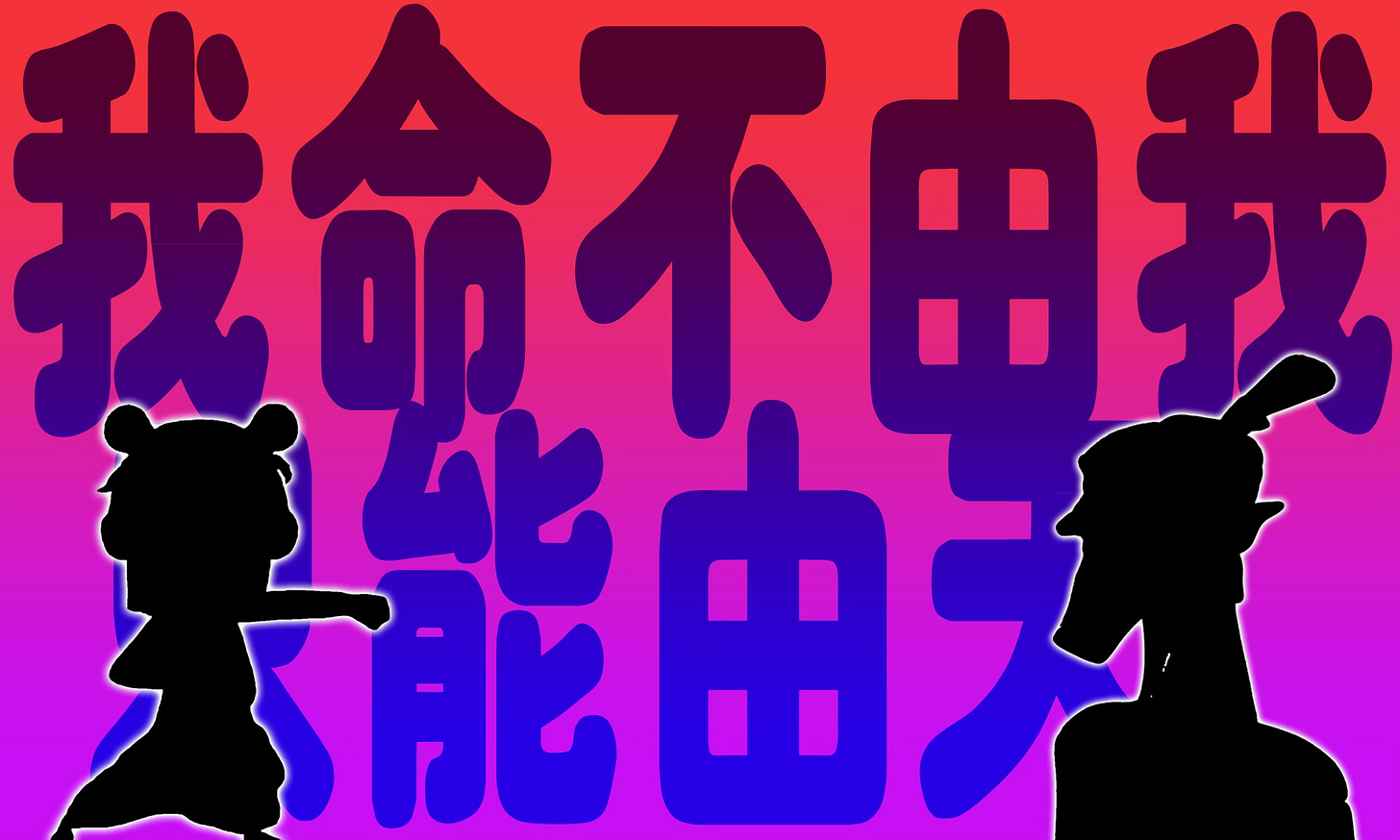"My fate is not determined by me, only by heaven" — Phrase of the Week
A new phrase explains changing sentiment among movie goers in China

Our phrase of the week is: "My fate is not determined by me, only by heaven" (我命不由我只能由天 wǒ mìng bù yóu wǒ zhǐ néng yóu tiān).
Context
The animated film Ne Zha 2: The Demon Child Conquers the Dragon King (哪吒之魔童闹海), has become a box office sensation, earning 10 billion yuan ($1.4 billion) over the New Year period. By 27 February, Ne Zha 2 had grossed $1.92 billion, making it the highest-grossing animated movie ever, surpassing Inside Out 2 (2024).
Ne Zha is a rebellious and powerful child deity from Chinese mythology, as told in the classical novel, Investiture of the Gods (封神演义). In the tale, Ne Zha defies fate, sacrificing himself to make amends before being reborn.
The first Ne Zha animated movie, released in 2019, reimagined this struggle. The sequel expands on it with his battle against the Dragon King’s forces.
While the first film saw audiences identify with Ne Zha, many now resonate with the villainous Shen Gongbao (申公豹). In Investiture of the Gods, Shen is a mystical sorcerer wielding a sword and riding a tiger (白额虎). He fights his way up from the demon clan to the celestial court—only to be cast aside.
Many in China see Shen’s fate as their own. In modern terms, Ne Zha is seen as privileged, like a “second-generation official” (官二代), while Shen is like an overworked “workhorse” (牛马) or a “small-town test taker” (小镇做题家) from a humble background who still faces barriers.
In the commentary about this shift in audience sentiment, a new phrase has been coined which draws from the Ne Zha 1 movie.
Nezha's life philosophy is "My fate is determined by me, not by heaven," while Shen Gongbao's life can be summed up as "My fate is not determined by me, but only by heaven."
哪吒的人生信条是“我命由我不由天”,申公豹的豹生缩影则是“我命不由我只能由天”。
Nézhā de rénshēng xìntiáo shì "wǒ mìng yóu wǒ bù yóu tiān," Shēn Gōngbào de bàoshēng suōyǐng zé shì "wǒ mìng bù yóu wǒ zhǐ néng yóu tiān."
And with that, we have our Sinica Phrase of the Week!
What it means
"My fate is not determined by me, but only by heaven" is a twist on the original phrase, "My fate is determined by me, not by heaven" (我命由我不由天). This well-known saying was popularized by the 2019 Ne Zha animated film, where it became the character’s defining motto—symbolizing his defiance and determination to carve out his own destiny.
The phrase has deep historical roots in Taoist and Buddhist thought. Ne Zha, originally from Indian mythology, was later reimagined in Investiture of the Gods (封神演义), a late Ming dynasty Taoist-themed novel attributed to Xu Zhonglin 许仲琳. In this version, he is transported into the Shang dynasty and ultimately becomes a Taoist deity.
The first recorded version of "My fate is not determined by me, but only by heaven" comes from the Xi Sheng Jing (西升经), a Taoist text from the Western Jin (西晋, 266–316), stating:
"My fate is in my own hands, not dictated by heaven or earth."
"我命在我,不属天地。"
Wǒ mìng zài wǒ, bù shǔ tiāndì.
Later, Eastern Jin (东晋, 317–420) scholar Ge Hong 葛洪 cited an early Taoist text, Oracle Bone Writings (龟甲文), in his work Baopuzi (抱朴子), reinforcing self-determination:
"My fate is in my own hands, not in the heavens. Immortality will be granted to those who remain determined in alchemy."
"我命在我不在天,还丹成金亿万年。"
Wǒ mìng zài wǒ bú zài tiān, huándān chéng jīn yì wàn nián.
In 2025, following Ne Zha 2 and shifting audience sentiment, many viewers resonated more with the antagonist, Shen Gongbao (申公豹). As a result, the phrase has taken on a darker twist, reflecting a growing sense of powerlessness:
"My fate is not determined by me, but only by heaven."
"我命不由我只能由天。"
Wǒ mìng bù yóu wǒ, zhǐ néng yóu tiān.
This reversal of Ne Zha’s original defiance mirrors how many in China feel today, explaining why Shen Gongbao’s character has struck such a chord.
Andrew Methven is the author of RealTime Mandarin, a resource to help you learn contemporary Chinese in context, and stay on top of the latest language trends in China.
Read more about how this story is being discussed in the Chinese media in this week’s RealTime Mandarin.



